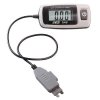NJP_MAN
Pattern Altitude
Battery keeps dying when I'm out of town for a few days. New battery so that's good. After I jump it, the alternator will charge it up just fine. Something is drawing on the battery.
Will just disconnecting the negative terminal keep the battery from draining? I can't see why not. The reason I ask is because the negative is so much easier to disco than the positive.
Will just disconnecting the negative terminal keep the battery from draining? I can't see why not. The reason I ask is because the negative is so much easier to disco than the positive.


